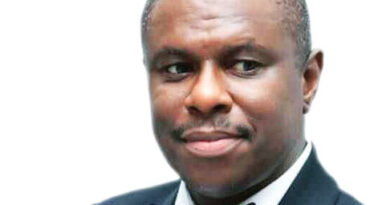Cost of Governance Again! – Dr.Muiz Banire
Nigerian problems can make you sound like a broken record. Recent developments in some other countries, particularly Kenya, made me to revert to a topic I had treated several times in the past. Consequent upon the violent protests against the Finance Bill, 2024, in Kenya and the withdrawal of same, the government embarked on austerity measures that will facilitate the realization of the year’s budget. As I watched the broadcast of the Kenyan President, I pondered over what I have been saying in the last six years. I have always advocated strongly for huge reduction in cost of governance, to the extent that I have written no fewer than seven columns on the subject and delivered several lectures to that effect.
Regrettably, my warnings have not been heeded in practicality but, at best, dignified with tokenism. This has certainly proved to be unhelpful as I cannot, in good conscience, own up to the fact that successive governments, for whatever reasons, have not been able to summon the political will to implement those suggestions I consider to be harmless measures as opposed to the detrimental ones embraced. There was an attempt to implement the Oronsaye report, just for it to end up the way other previous governments have treated the report. This is one of the so many measures that ought to have been taken. The number of political appointees is not only staggering but continues to soar endlessly. As I write this, I honestly weep for the country. Who will help us? This system of government we are practicing is hurting rather than helping the country. Except there is urgent intervention by embracing those measures and many more reeled out by the Kenyan President, the standard of living will keep on degenerating and beyond tolerable levels. The welfare of the people must take the front seat. At the stage we are now, if we must suspend some humongous projects for the survival of our people, we need to. What is called good governance is not resident in the philosophy of bamu bamu lawa yo, awa o mo pe’bi in pa omo eni kookan; a philosophy of selfishness and utter insensitivity.
The welfare of the people; the welfare of the masses is the cornerstone of good governance. It is good governance that will pave way for security and prosperity. It is mandatory for all leaders to school themselves in the art of good governance. No amount of efforts to attain and guarantee good governance is too much. No system can boast of accountability without prudence and good management of resources. Wastage in government only results in austerity in the lives of the people as such resources wasted can never bring abundance that will make the people prosper. Wikipaedia, The Free Encyclopaedia, defines good governance as “the process of measuring how public institutions conduct public affairs and manage public resources and guarantee the realization of human rights in a manner essentially free of abuse and corruption and with due regard for the rule of law.” Emphasis must be placed at all times on effective and efficient management “of public resources …free of abuse and corruption.” It is not a virtue for any government to encumber public purse with over-bloated staff who draw salaries and emoluments from the public purse with little or no service to build the commonwealth.
The concept of good governance, according to Wikipaedia, “thus emerges as a model to compare ineffective economies or political bodies with viable economies and political bodies.” Fundamentally, it all boils down to economies and their management. The implication is that an economy characterized by waste of resources is not a developed one and neither can it be said to be futuristic in thinking. It is equally jeopardizing its present and preventing peace and harmony in its affairs. It only breeds a lazy elite with a characteristic culture of embezzlement and corruption while it fans the embers of docility in the youth who may not see any reason why they cannot aspire to occupy the offices by which resources are being frittered into private purses. Wealth without enterprise becomes the emblem of economic activities and what spurs the nation into poverty. Such a society must have a huge population of hangers-on and a redundant workforce that is not ready to be productive and contribute to its own wellbeing.
There will be a mass of hungry adults who constitute a breeding furnace for a fire of poverty-stricken children. A hungry populace will never praise its leadership save for one that has lost its soul and consciousness and that is why leadership in any society is responsibility. Election or appointment into public offices must be to serve and cannot be a basis for mere patronage or enrichment of cronies at the expense of the electorate. There is urgent need across board at all levels of governance to immediately and substantially reduce the number of political aides. I have witnessed a situation where an impotent workforce of youths has rather become a curse and a workshop for recruitment of hoodlums and vagabonds.
These are the people who graduate to become assassins, kidnappers and robbers. A society where this is the norm can never achieve growth and its natural resources will only be an albatross; it will serve to mobilise its masses into a consuming inferno that will destroy the society in the long run. A society that needs development does not engage in waste of resources. This inevitably requires that it reduces its overhead, which will enable it to cut down on its expenses. In recent times, I see the obscene convoy of political leaders at all levels and I imagine the quantum of resources being wasted, coupled with the contamination of the climate resulting in catastrophic consequences globally.
Maintaining an over-populated legislature has been an albatross that has proven unprofitable to Nigeria over the years and that is why there has been strong criticism of our bicameral system of legislature. Recruiting 360 members of House of Representatives and 109 senators to do what either of the two Houses can effectively perform is a sign of a lunatic pretence to democracy. Yet, we do not seem to realize this and prefer to continue running towards xxx. If it is an experiment, by now it ought to be clear to us that four years of practicing it between 1979 and 1983 and 25 years of deepening it into our governance structure between 1999 and 2024 must be sufficient to make a conclusion. The system has not been as profitable to us as it is to any other country where we are copying it from. Why don’t we abandon it and fashion out our own federalism, if that is the system that still fascinates us? My preference as I have loudly preached is parliamentarism.
A masquerade that has danced in entertaining the market gathering for more than 20 years without earning accolades or riches must be ditched for another idol. It is certain that continuing to run the system on the same principles cannot be productive and neither can it engender prosperity for us as a nation or people. With the myriads of challenges that we are having, ranging from corruption to insecurity, mass poverty, criminality, lack of productivity, a currency losing value on a daily basis, etc., it is expected that our leaders must put on their thinking cap and start considering the way out of these myriads of crisis. No society needs to be set on the right path by force of revolution or bloodshed. It is only by guaranteeing prosperity for the masses that the rich can sleep without threat of robbery or mass attack.
The President repeatedly said it when he was the Governor of Lagos State that the children of the poor that we fail to train shall constitute a threat to our children that are being sent abroad. The rich cannot sleep when the poor are complaining of hunger. Mass and extreme poverty in the midst of plenty is an emblem of a mismanaged country and a major contributory factor to this is waste of resources on excessively populated ruling officials. Majority of those handlers and hangers-on of power do not have any business being there and they would rather fare better by being meaningfully engaged in the productive sector of the economy.
A young man claiming to be a special adviser to a useless politician that is contributing nothing to the economy has displayed a patent inability to positively advise himself and should rather be seen as a parasite on the system just like the person who engaged him in the pointless activity of redundancy. Creating a retinue of unproductive officials is like engaging a million people to do what 100 people can accomplish. Why don’t we learn from mistakes that we have committed over the years? When the President muted the idea of implementing the Oronsaye Report on reducing cost of governance, I was excited and believed that we were moving in the right direction. This step intended to be taken by the President should not be abandoned and it is not too late for Mr. President to reconsider the culture of appointments that has taken over the scene in the last one year.
His ambition to achieve prosperity for Nigeria can only be possible when such is premised on good policies. Whatever monies we make from removal of subsidy and increment in taxes and other duties can only serve the people when they are channeled into productivity and not frittered to line pockets of officials whose contributions to the economy pales into insignificance when compared with the suffering and sacrifices of the masses. The speech of Mr. President on the Democracy Day in its loftiness and aspiration can only be meaningful when he prevents compensatory politics from diminishing his efforts. No reasonable businessman hires a truckload of workers for what a few men or women can do.
The civil service of Nigeria requires to be more productive if we really aim to be regarded as a serious people and that is why Oronsaye Report must not only be implemented but be implemented with seriousness and promptitude as to create an institutional structure to prevent such abuse of political appointment or staffing of the civil service in future. We must also work on our Constitution which prescribes bicameral legislature the practice of which over the years has been shown to be a mere conduit pipe to wastage and profligacy. Equally, amounts payable for services being purportedly rendered by politicians should be reduced to show seriousness in addressing the challenges confronting the nation.




